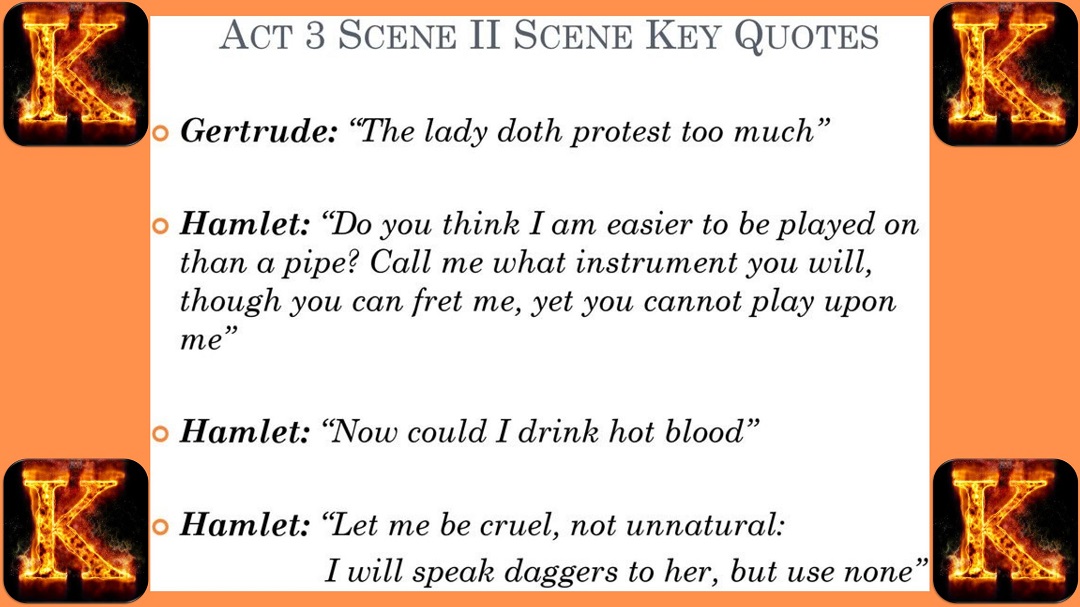Introduction
The phrase "The lady doth protest too much" is one of the most enduring lines from William Shakespeare’s Hamlet, often cited in both literary and everyday contexts. This article explores the origins, meaning, and modern relevance of the phrase, revealing how a seemingly simple observation can carry layers of psychological and rhetorical insight.
Origin and Context in Hamlet
The quote appears in Act III, Scene II of Hamlet during the play-within-a-play orchestrated by Prince Hamlet to gauge King Claudius’s guilt. As the actors perform a scene mirroring the suspected murder of Hamlet’s father, the character known as the Player Queen makes repeated, emphatic vows of loyalty to her husband, even in the face of his potential death.
Observing this, Queen Gertrude, Hamlet’s mother, casually remarks on the character’s exaggerated declarations. In response, Hamlet quips:
“The lady doth protest too much, methinks.”
Ironically, Queen Gertrude is herself the target of Hamlet’s veiled criticism. Her rapid remarriage to Claudius following the king’s death mirrors the Player Queen’s hollow pledges, highlighting a tension between appearance and sincerity.
Word-by-Word Breakdown
-
“The lady” – Refers to a specific woman; in the scene, the Player Queen, and by extension, Queen Gertrude.
-
“Doth” – An archaic form of “does,” indicating present action.
-
“Protest” – In Elizabethan English, "protest" meant to declare or affirm solemnly, not to object. The shift in meaning over time adds a layer of complexity to the modern interpretation.
-
“Too much” – Implies excess, exaggeration, or overstatement beyond credibility.
Taken together, the phrase suggests that when someone makes overly emphatic declarations, especially of innocence, loyalty, or virtue—it may ironically signal the opposite: that they are not to be trusted.
Modern Interpretations and Cultural Relevance
Over time, “The lady doth protest too much” has evolved into a widely used idiom. Today, it describes situations where someone’s strenuous denials or affirmations are perceived as suspicious; the louder and more repeated the denial, the less believable it becomes. It is often invoked in political discourse, celebrity scandals, or personal relationships to highlight the gap between words and perceived truth.
By dissecting the language and context of this famous quote, we uncover its enduring power as a lens through which we question authenticity and motive. Shakespeare’s line continues to resonate precisely because it captures a timeless psychological insight: genuine conviction rarely needs to shout.
Read Also: Apocalyptic Literature: End of the World in Ancient Texts
Historical Origins and Context
Origin in Shakespeare's Hamlet
The phrase “The lady doth protest too much” originates from William Shakespeare’s renowned tragedy Hamlet, specifically Act III, Scene II. In this scene, Prince Hamlet stages a play titled The Murder of Gonzago to mirror the suspected circumstances of his father’s death and observe the reaction of his uncle, King Claudius, whom he suspects of murder.
As the play unfolds, the character of the Player Queen delivers a series of passionate declarations of fidelity to her husband. She vows she would never remarry if he were to die. These exaggerated declarations are meant to reflect Queen Gertrude’s real-life actions, as she married Claudius shortly after the death of Hamlet’s father.
It is during this moment that Hamlet wryly comments to his mother:
“The lady doth protest too much, methinks.”
Although Gertrude responds to the scene with a seemingly detached observation, her words subtly reinforce Hamlet’s suspicions. The line draws attention to the idea that excessive declarations of loyalty or innocence may be disingenuous. Shakespeare uses this moment to blur the lines between performance and reality, exposing underlying tensions in the relationships among the characters.
Interpretation within the Play
Gertrude’s remark, though brief, underscores Shakespeare’s exploration of deception, self-awareness, and the difference between appearance and reality. The phrase suggests that when someone insists too strongly on their virtue or honesty, it can provoke doubt rather than trust.
Within the broader narrative of Hamlet, this moment reflects Prince Hamlet's struggle to discern truth in a world full of manipulation and deceit. Gertrude's comment on the Player Queen also invites the audience to reflect on Gertrude herself. Her swift remarriage raises similar questions about sincerity and loyalty, mirroring the themes presented on stage.
Shakespeare skillfully uses this phrase to challenge the audience to look beyond surface-level assertions. The scene encourages a critical evaluation of both the characters’ words and their deeper motivations.
Unraveling the Meaning: Excessive Protests and Their Implications
Excessive Protests and Sincerity
One interpretation of the phrase is that when someone protests too forcefully or repeatedly, it may indicate a lack of sincerity. Excessive protest can come across as a defensive act intended to convince others or even to reassure oneself. Instead of reinforcing credibility, such intensity may create doubt and draw attention to the very issue being denied.
This phenomenon can be seen in various scenarios where individuals declare their innocence or loyalty in an exaggerated manner. Rather than clearing suspicion, these overstatements can raise further questions. They prompt us to consider whether the individual is hiding something beneath the surface.
Concealment and Deception
Another dimension of the phrase relates to the idea of using denial as a form of concealment. When someone insists too much, they might be attempting to divert attention from what they are trying to hide. This strategy can serve as a distraction, shifting focus away from the underlying truth or the subject of scrutiny.
In this context, the phrase becomes a tool for evaluating motive and authenticity. It encourages us to ask whether the protestations are sincere or if they are a calculated attempt to manipulate perception. The more forcefully someone denies an accusation, the more we are inclined to question why such denial is necessary.
Thus, the phrase “The lady doth protest too much” remains relevant centuries after it was first written. It continues to capture a universal insight about human behavior. When people go to great lengths to assert their innocence or devotion, their insistence may actually signal the opposite.
Whether in Shakespeare's Denmark or in modern conversations, the phrase encourages us to listen closely, observe critically, and question what may be hiding beneath the surface. In the sections that follow, we will explore the psychological, cultural, and contemporary relevance of this famous line. Through these lenses, we will deepen our understanding of why the lady protests and what it reveals about human communication and intent.
Read Also: Reflections on “Picking Cotton” & the Innocence Project
The Psychological Significance of Protesting Too Much
Defensive Reactions: Denial, Projection, and Self-Deception
The phrase “The lady doth protest too much” resonates deeply with key psychological defense mechanisms. These mechanisms help individuals cope with uncomfortable truths or emotional threats but can also reveal inner conflicts when expressed excessively.
- Denial occurs when someone refuses to accept reality, often to protect themselves from emotional pain or perceived failure. Excessive protest can be a form of denial, used to avoid facing difficult truths or to preserve a certain self-image.
- Projection involves attributing one’s own unwanted feelings, thoughts, or impulses to others. A person who loudly criticizes or denies a certain behavior might be unconsciously projecting their own internal struggle onto someone else.
- Self-deception is the act of convincing oneself of a false belief in order to reduce anxiety or protect the ego. In this case, the individual is not only trying to convince others but also themselves, using strong denials as a psychological buffer from uncomfortable realities.
Encouraging Self-Reflection and Authenticity
The phrase also acts as a powerful tool for introspection. It urges individuals to question the sincerity of their own words and motivations. When someone reacts with forceful denials, it can be an opportunity to ask: What am I afraid others (or I) might see in me?
This self-examination can reveal hidden insecurities, fears, or unresolved emotional conflicts. By recognizing these underlying influences, individuals can begin to shift away from reactive behavior and move toward more genuine communication.
Developing self-awareness in this way supports stronger relationships and emotional maturity. The phrase thus serves not only as a critique but as an invitation to understand ourselves more deeply and communicate more honestly.

Cultural Legacy and Literary Impact
Shakespeare’s Enduring Insight into Human Nature
The phrase owes its lasting influence to William Shakespeare’s masterful writing in Hamlet. His ability to distill complex psychological and emotional truths into concise lines has kept his works relevant for over four centuries.
Shakespeare’s plays, particularly Hamlet, explore universal themes such as appearance versus reality, guilt, loyalty, and inner conflict. The phrase “The lady doth protest too much” perfectly captures these themes, reflecting how people often try to mask uncomfortable truths through exaggerated declarations.
Because of Shakespeare’s immense cultural impact, the line has transcended the stage. It has entered the realm of everyday speech, becoming a shorthand for describing situations in which someone's denials appear suspicious or overly defensive.
Popular Culture: A Phrase for the Ages
Over time, the phrase has appeared in countless books, movies, TV shows, and songs. Writers and creators use it to highlight moments of potential insincerity or overcompensation in a character's speech. It is often employed to create irony or hint at hidden truths beneath a character’s words.
In casual conversation, people use it to express skepticism when someone protests too vigorously, especially when denying wrongdoing or asserting loyalty. It has become a cultural idiom that allows for subtle critique without direct confrontation.
Its widespread usage shows the phrase’s adaptability and continued relevance. Whether in media or daily interactions, it remains a powerful expression of doubt and a reminder that sometimes, saying too much reveals more than intended.
Read also: Skeleton Argument for a Case Summary Judgment
Contemporary Usage
Analyzing Modern Applications in Politics, Public Relations, and Social Media
"The lady doth protest too much" continues to find relevance in modern discourse. It is frequently used to comment on excessive or insincere protests. In politics, the phrase often emerges when politicians vigorously deny allegations in ways that seem exaggerated. Observers may use the phrase to express doubt and question the authenticity of such denials. It acts as a prompt to critically assess the motives behind political statements.
In public relations, individuals or organizations may go to great lengths to defend their reputations. When these defenses appear overly intense, the phrase is often invoked to highlight possible insincerity or attempts to distract from inconvenient truths.
Social media platforms have also amplified this phenomenon. Online users frequently identify hyperbolic defenses and use the phrase to point out what they perceive as overcompensation or a lack of authenticity.
Skepticism and Doubt
A Phrase Reflecting Critical Thinking in an Age of Overstatement
Today, the phrase represents a broader cultural value: healthy skepticism. In an age of information overload, it encourages people to question exaggerated claims or defensive behaviors. When protests are unusually forceful, the phrase reminds us to look beneath the surface.
This cultural interpretation encourages critical analysis of intentions, especially in environments where misinformation spreads easily. By invoking the phrase, individuals promote thoughtful questioning and a demand for evidence rather than blind acceptance.
It also underscores the importance of open and honest communication. Excessive protest may hinder dialogue, while transparency fosters understanding and trust.
Feminist Interpretations
Gendered Implications and the Credibility of Women's Voices
"The lady doth protest too much" raises important questions when examined through a feminist lens. The phrase may reflect and reinforce gender stereotypes, especially regarding how society evaluates women's credibility and emotional expression. Historically, women have been expected to remain quiet or composed. If they protest too strongly, they risk being labeled as insincere or irrational.
This dynamic can silence women and undermine their ability to advocate for themselves. Feminist interpretations argue that the phrase reflects societal biases that demand women work harder than men to justify their actions or defend their positions.
Intersectionality and Power Dynamics
Understanding How Identity Shapes Reception of Protest
Analyzing the phrase through the lens of intersectionality deepens our understanding of its implications. Women from marginalized backgrounds, particularly those facing compounded challenges due to race, class, or sexuality, may find their protests met with even more skepticism. The phrase thus exposes how power and privilege affect whose voice is heard and whose protest is trusted.
In contrast, individuals with social privilege may have their protests accepted without question. This disparity reveals the ways structural inequality shapes communication, credibility, and public perception.
Variations in Language
Translations that Preserve the Original Message
The phrase has been adapted across many languages while preserving its central idea of excessive denial signaling guilt or insincerity. In French, for example, it appears as "La dame proteste un peu trop". In Spanish, one might hear "La dama protesta demasiado". These translations maintain the essence of the original phrase but reflect the grammar and style of their linguistic contexts.
The persistence of the phrase’s meaning in translation shows its universality and relevance across cultures.
Cultural Adaptations
Reinterpretations in Global Literature and Media
Beyond direct translation, the phrase has been creatively adapted in different cultural settings. Writers and media commentators often tailor the sentiment to local norms or idioms, drawing from the same theme of excessive denial revealing deeper truth.
For instance, in some cultures, phrases similar in tone or structure may reflect suspicion toward overly defensive behavior. These adaptations preserve the idea behind Shakespeare’s words while making them accessible to broader audiences.
Read Also: Company Description in Business Plan Assignment
The Lady Doth Protest Too Much: A Call for Reflection
Self-Reflection and Authenticity
The phrase "the lady doth protest too much" urges individuals to look inward. It challenges us to examine why we sometimes respond with excessive denial or defensiveness. These reactions may stem from hidden fears, a desire to preserve our self-image, or uncertainty about our own convictions.
Through honest self-reflection, we can move toward greater authenticity in communication. This means becoming more aware of our emotional triggers, biases, and the unconscious habits that shape our speech. When we recognize these patterns, we can express ourselves more sincerely, fostering trust and deeper human connection.
Critical Thinking and Discourse
The phrase also serves as a reminder of the importance of critical thinking in public and private dialogue. In an era of rapid information exchange, where exaggeration and misinformation often dominate, the ability to evaluate statements carefully is vital.
Cultivating discernment allows us to distinguish truth from manipulation. Healthy skepticism does not mean rejecting everything, but rather pausing to assess the motivations behind words. This type of thoughtful engagement enriches both personal interactions and broader societal discourse.
Meaningful communication is rooted in curiosity and openness. By promoting respectful dialogue and listening with intention, we help build environments where ideas are shared honestly and thoughtfully.
Fostering a Culture of Meaningful Dialogue
When we apply the lessons of this phrase to our own behavior and conversations, we begin to foster a culture that values truth over performance. Self-awareness and integrity in how we speak and respond create space for empathy, understanding, and growth.
Whether in personal relationships or public discourse, authenticity and critical reflection shape the quality of our interactions. They also encourage us to support others in expressing themselves honestly, without fear of judgment or the need for overcompensation.



Comments are closed!